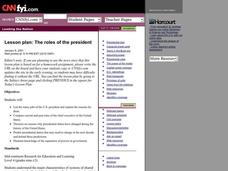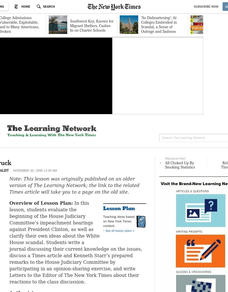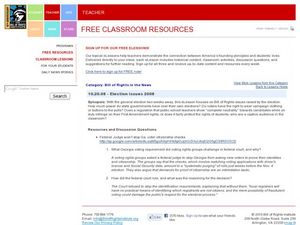Curated OER
Government 13.1 and 13.2
In this government worksheet, students answer 10 fill in the blank questions and 10 short answer questions regarding presidential powers.
Curated OER
How Can the President Influence Legislation?
Students examine presidential powers. For this Executive Branch lesson, students listen to their instructor present a lecture on the president's influence on legislation as they view a 7-slide PowerPoint presentation.
Maryland Department of Education
Our Children Can Soar
Amazing efforts of African American leaders are celebrated in a lesson plan on civil participation. The engaging resource focuses on primary and secondary sources to analyze the impact of African American leaders such as Ella Fitzgerald....
Curated OER
The Roles of the President
High schoolers list the many jobs of the U.S. president and explain the reasons for them. They compare current and past roles of the chief executive of the United States.
Curated OER
Bill of Rights in the News: Election Issues 2008
Students consider First Amendment rights. In this Bill of Rights lesson plan, students complete an activity guide regarding constitutional rights issues raised in the 2008 presidential election. Students respond to discussion questions...
Curated OER
Introduction to Presidential Power
Twelfth graders describe the power of the President. In this Constitution lesson students reflect on the power given to the president of the United States by the wording in the Constitution. Students give their opinion.
Curated OER
Presidential Power and Influence
Students analyze the powers and duties that Article II of the US Constitution grants the President. They determine the influence the President has on the nation and how philanthropy changes in a nation.
John F. Kennedy Presidential Library & Museum
Analyzing the Inaugural Address
Get high school historians to step outside their own shoes by responding to JFK's inaugural address from the perspective of a civil rights activist, a soviet diplomat, or a Cuban exile. After a class discussion about the address, the...
Carolina K-12
Preventing Voter Fraud or Encouraging Voter Suppression?
The issues of voter fraud and voter suppression are relevant in every election, local as well as national. Soon-to-be voters learn about a recent bill proposed in North Carolina, the Voter Information and Verification Act, and decide for...
Curated OER
Constitution Worksheet
In this U.S. Constitution learning exercise, students respond to 63 short answer questions about Articles I-VII of the American plan for government.
Curated OER
The Importance of Inauguration Day
As Inauguration Day approaches, prepare your learners by researching the protocol of years past.
Facing History and Ourselves
The Audacity of a Vote: Susan B. Anthony’s Arrest
Susan B. Anthony's speech "Is It a Crime for Women to Vote?" takes center stage in a lesson that asks class members to consider how they might respond to what they consider an unjust law. Groups work through the speech paragraph by...
Carolina K-12
How Do I Pre-Register and Vote in North Carolina?
This practical activity helps young citizens learn about pre-registration to vote in elections, discuss the merits and flaws of the pre-registration process, and register themselves. The concluding activity has young voters creating an...
John F. Kennedy Presidential Library & Museum
Ask Not What Your Country Can Do for You
Ask not what the lesson here can do for you, but what you can do with the lesson. The answer is quite a lot! Young scholars revisit JFK's famous inaugural address with a focus on his plea for civic engagement. There's a letter to JFK...
Curated OER
Help Wanted: President of the United States
Learners consider qualities and United States president should have. In this government lesson, students research the responsibilities of the president and use that information to create an advertisement that describes the job and...
Kids Voting USA
Kids Voting USA: K-2 Classroom Activities
Address both social studies and critical reading skills with a resource dedicated to the voting process, the American democracy, and the ability to evaluate information in order to develop a stance on an issue. Each themed activity set...
Teaching Tolerance
The True History of Voting Rights
Explore what voting rights really are in an intriguing activity that explores the history of American voting. The resource examines the timeline of voting rights in the United States with group discussions, hands-on-activities, and...
Annenberg Foundation
Student Voices
Whether it's an election year or not, a unit on voting patterns and political campaigns will awaken the civic pride in your high school citizens. Divided into six parts, the curriculum covers various facets of an election, including...
National First Ladies' Library
Presidential Illness: Constitutional Crisis?
Pupils use the internet and other sources to explore incidents where the President of the United States has become incapacitated. They research the reasons for the 25th Amendment, and solutions set in place to solve the problem of...
Curated OER
A President's Home and the President's House
Students identify specific examples demonstrating how present-day White House reflects duties, powers, and privileges of the office of President, and
compare and contrast Thomas Jefferson's Monticello with the White House.
Curated OER
Comparative Government: Japan & the United States
Learners compare the governmental systems of Japan and the United States. As a class, they discuss the differences between the parliamentary system and the presidential system. Pupils read provided handouts about the duties of a a...
Curated OER
The Nonlegislative Powers
Eleventh graders examine the powers of Congress. In this American Government lesson, 11th graders read about Congress. Students complete a worksheet on their findings.
Curated OER
iCivics: Executive Command
Students explore the role of President of the United States. In this executive branch lesson plan, students play an online game that requires them to consider the needs of Americans as they act as president.

























